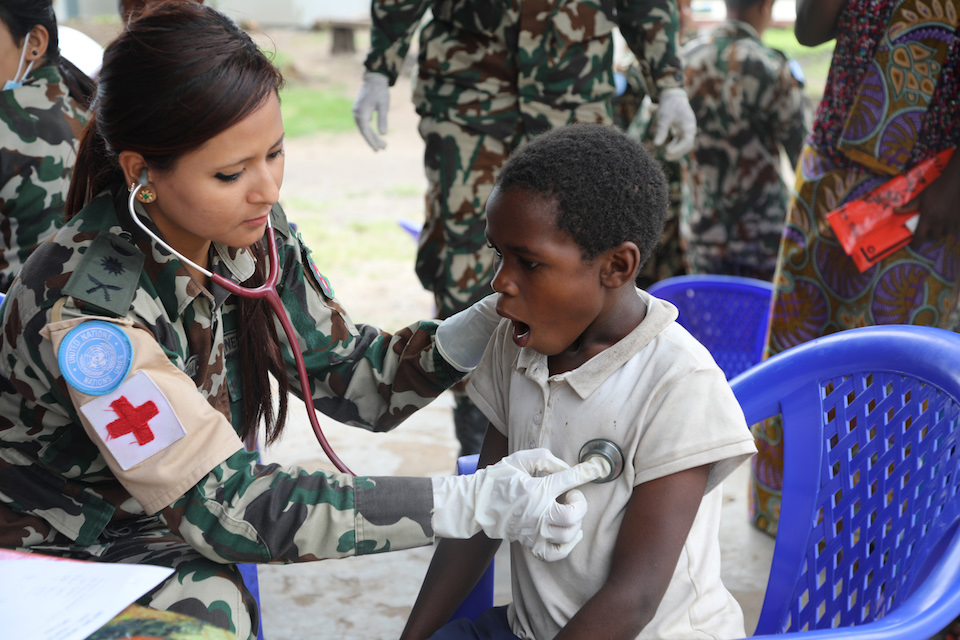Elections and protection of healthcare workers and civilians in DRC
Statement by Stephen Hickey, UK Political Coordinator at the UN, at the Security Council briefing on the Democratic Republic of Congo.

Thank you, Mr President. I’d like to focus on three issues: the security, humanitarian and political situations in the DRC.
Mr President, the deterioration in the security situation in North Kivu and Ituri provinces is particularly concerning. Civilians continue to face killings and kidnappings in Beni territory. In the Petit Nor, citizens face illegal taxation, rape and killing from armed groups like NDC-R. Attacks against Ebola responders in North Kivu continue to undermine the response to the outbreak. The government must do more to protect civilians and responders and to provide greater general stability, including through holding perpetrators to account in the courts and by doing more to address the underlying drivers of conflict. We note with concern that armed groups in North Kivu are reported to have perpetrated over half of all documented cases of sexual violence in DRC during this reporting period.
As the Ambassador of Kuwait noted during his briefing, some members of the 1533 Committee and MONUSCO have expressed an interest to list individuals, including based on the sexual violence designation criteria. In this regard, the United Kingdom encourages the Group of Experts to provide the committee with updated information on the sanctioned individuals and entities and also to provide statements of case in relation to the sexual violence designation criteria.
It’s particularly alarming that some elements of the DRC armed forces are alleged to have colluded with the NDC-R, the largest perpetrator of attacks against civilians in North Kivu. The United Kingdom welcomes the issuing of a warrant for the arrest of Guidon, the leader of the NDC-R, who is also under UN sanctions. We look forward to the government of the DRC taking action against Guidon and investigating and holding to account any FARDC members found guilty of using armed groups as proxies.
In Ituri, the note with concern that renewed violence has caused significant displacement of civilians and increased humanitarian needs. We also note that a hiatus in the political process to demobilise the FRPI armed group has led them to increase their activity. We look forward to President Tshisekedi’s support to enable the FRPI disarmament process to move forward, including the signing of a peace agreement between the government and the FRPI.
Second, Mr President, the humanitarian situation is dire and deeply concerning in the DRC. More than one in ten Congolese are expected to be in need of protection and humanitarian assistance in 2019.
The UK is at the forefront of the humanitarian response. In 2013, we provided $124 million to humanitarian appeals, making the UK the second largest humanitarian donor in the DRC and the largest contributor to the DRC’s Multi Donor Humanitarian Fund. We echo the Secretary-General’s call for donors and partners to provide the necessary support in order to close the humanitarian funding gap as quickly as possible. And this is particularly relevant to the appeal for further funding to address the Ebola outbreak where much more is needed. And we urge other countries, particularly those which have a presence and a history in the region, to support the response with funding, technical expertise and political support.
Mr President, finally, let me say a brief word on the political situation. Despite some positive developments which we’ve heard about today, attention must not drift from the ongoing electoral process in the DRC, in particular the local elections planned for late 2019 and 2020. In this regard, we call for the prompt appointment of a new, balanced, inclusive leadership of the Independent National Electoral Commission, otherwise known as CENI. The production of an electoral calendar for the upcoming local elections will also help efforts to ensure that they are credible, free and fair. By taking these steps, the government of the DRC will help to generate trust among the population in future electoral processes and strengthen democracy in the DRC.
The UK recognises some positive steps taken by President Tshisekedi since his election, including the release of several political detainees and efforts to promote regional collaboration. However, this is just the start. It is vital that when the new government is finally formed, it makes concrete progress on President Tshisekedi’s commitments to improve human rights, strengthen transparency and the rule of law, drive forward poverty reduction and tackle the Ebola outbreak. The United Kingdom, therefore, urges all Congolese parties to engage constructively to enable the swift formation of a government - a government that can deliver the change that the Congolese people clearly voted for.
Thank you.